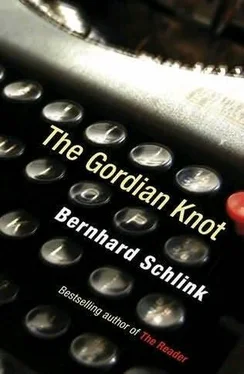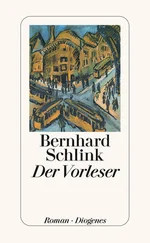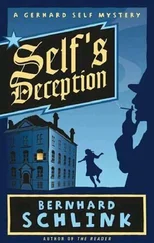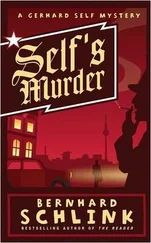“So go to the police! Go ahead, ruin everything we had together! You’re such a weakling, such a coward! Instead of finishing what you started, instead of seeing it through, you have to destroy everything. Well, go to the police! But don’t you think…” Her voice hissed, her words were crystal clear, her sentences a farce of logical reasoning. He heard the spite in her voice, and lost control of the situation, like a man whose expensive watch falls into deep waters, and who, even as it is falling, before it plunges into the water and disappears, realizes its final loss. Perhaps it could still be caught, by a fast snatch or a leap, but he feels a lameness that turns into the numbness of the pain of loss.
He shrugged his shoulders. Feeling empty, he walked past Françoise and out of the office.
“Wait a moment, my young friend, wait…” Bulnakov called out after him, but Georg didn’t turn around.
HE WALKED PAST THE STATUE OF THE DRUMMER BOY and went into the bar on the corner. LE TAMBOUR D’ARCOLE-it was the first time he’d read the statue’s inscription. He tried to remember what heroic role the drummer boy had played in the Battle of Arcole. Thinking of heroism made him wince, and he ordered coffee and wine. This time the window was clean, and the town square lay clearly before him under the blue sky of the afternoon.
What was so bad? His attempt to threaten them with the police in order to save Françoise’s brother had misfired. But damn the whole Kramsky clan. All the translations he’d done had ended up with the Polish or Soviet secret service. But the games the big powers played with soldiers, cannons, tanks, planes, and helicopters would go on. Georg imagined generals standing in a sandbox, one going “b-r-r-r-r” with a toy helicopter in his hand, the other “s-h-h-h-h” with an airplane. Had they really killed Maurin in order to give him, Georg, access to the Mermoz plans? He and Françoise had indeed driven to the conference in Lyon in her Citroën. He’d left his Peugeot in Cadenet, and when they got back from Lyon he hadn’t found it where he thought he’d parked it. He felt a surge of fear. He steadied his nerves: would they really risk everything by letting him go to the police?
And what about Françoise? He felt it was all over between the two of them, but he didn’t love her any less, or feel any less close to her than-than yesterday. A day ago his world had still been intact.
He felt as if he were sitting in a hospital bed after an amputation, looking for the first time at a leg that was no longer there and over which the sheet no longer bulged. The eye sees it, the mind registers it, and yet the patient expects that ultimately he will get up and walk away, with his toe itching.
Georg looked out the window. Françoise was coming out of a side street onto the square. She walked toward her car, stopped, walked a few steps farther, and stopped again. She had seen his parked car. Slowly she turned and looked in the direction of the bar where he was sitting. Dazzled by the sun she craned her neck, trying to catch sight of him. Then she walked toward the bar. He saw her bouncy tread, and her fast steps echoed in his ear, though he couldn’t hear them. She was wearing a black outfit and had a bright sweater draped over her shoulders, its sleeves tied above her chest.
His heart had always skipped a beat when he saw her coming from a distance, lost in thought, stopping by a storefront or a street musician and then strolling on and, upon catching sight of him, coming toward him with a quick step, a fluttering wave of her hand, and an expectant smile. Why did you betray me, he thought, why…
“I’ve got to rush-see you this evening?” she called out, popping her head in at the door. Then she was outside again. She sounded as she always did. He watched her hurry off, and finished his wine. On the way home he did some shopping, for both of them, as always. When she came home, roulades were simmering in the pot, a fire was burning in the fireplace, and music was playing. Amazed, he had seen himself going through the motions of shopping, tidying up, cooking. This isn’t really happening, it’s not real, this isn’t me. But he had managed to do everything with great ease.
Neither of them touched on the subject of the night before or the afternoon in Bulnakov’s office. They trod carefully, hesitantly, and he was taken aback at feeling the excitement of their first meeting. Later, in bed, after they had made love, he turned the light back on, sat up, and looked at her. “What is to become of us?” he asked.
She looked at him calmly. Georg couldn’t tell if the dimple over her right eyebrow indicated that she was thinking, or that she simply didn’t know what to say. Then she picked up the little crocheted bear by the radio alarm on Georg’s side, sat the bear on her chest, and brought its paws together in a begging motion.
“I want you to be happy,” she said. “Really happy.”
Nothing he would say could reach her. All he could do was throw her out, but he didn’t have the strength.
The next morning he drove to Marseille, gave the messenger from Mermoz the translated plans, and was given new ones. He wondered whether he should do the translation at home or at the office. He decided to make photocopies, even though the security regulations forbade it. He locked the originals away and took the copies home.
Around ten in the evening he heard her Citroën. He folded the copies, waited until she entered the house, and then went out onto the balcony by his study, where he hid the papers in a drainpipe. When she came in, she found him at his desk writing a letter. The same thing happened the following evening, and the one after that. Then she asked him at breakfast quite casually, while busying herself with her coffee, croissant, and eggs, “Hasn’t Mermoz been giving you any work these days?”
“I can’t complain.”
She stirred her coffee, though she hadn’t put either milk or sugar in it. “Don’t do anything silly, Georg.” Her voice sounded soft.
He was relieved when he had finished transcribing his translation from the copy onto the original plan and handed it in. Then he sat a long time studying the copies and the new plans, understanding more and more what he was dealing with. It had something to do with suspensions, which had been clear enough during the translation work. But what was supposed to be suspended, and where? Again he locked away the originals and put a copy in his briefcase.
As he drove home he sang at the top of his voice, feeling that he had won, that he had escaped the net in which Bulnakov had trapped him, that life went on. He drove fast, with a dreamy sureness. Near Ansouis he saw Gérard’s car coming toward him. They stopped on the road and talked through their open windows. “I’m going to pick up some fresh salmon in Pertuis,” Gérard told him. “Why don’t you come over this evening?”
GEORG DROVE ONTO THE DIRT TRACK, keeping an eye out for the sheep that had been grazing on the steep banks that morning. They had moved on.
He put the car into second and sped up. He had long weaned himself of the habit of going easy on the shock absorbers and exhaust. The sun, the mistral, the sharp smoke of his Gauloise, the pain in his temples from the fourth glass of pastis, the rattling on the washboard gravel path-it all fit perfectly.
He saw the dust whipped up by the other car beyond the bend in the dirt track before he saw or heard it. He wondered how so much dust could rise before it even appeared around the bend. The heavy black Citroën limousine came skidding in the bend and headed straight for Georg. In its wake the dust rose into a wall between the steep banks.
Читать дальше












